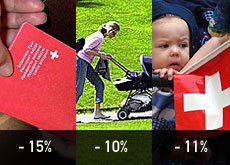Fourth time lucky for working mothers?

Switzerland is trying for the fourth time to introduce statutory maternity benefits for working women.
Rightwing politicians have forced a vote on a parliamentary decision to implement a nationwide scheme. The public will have its say on September 26.
Under the new slimmed-down proposal, approved by parliament, gainfully employed women would be entitled to 14-weeks’ paid maternity leave.
It is the fourth time in recent Swiss history that voters have been asked to decide on maternity benefits. A previous scheme was rejected at the ballot box five years ago.
Switzerland is the only western European country without statutory benefits, despite a 1945 clause in the Swiss constitution which calls for the introduction of a maternity scheme.
It is to complement an eight-week protective work ban for women who have given birth.
Currently, paid maternity leave is up to individual employers. It is estimated that up to one million women, mostly working in small companies and in poorly regulated industrial sectors, stand to benefit from the scheme.
Financial concerns
The rightwing Swiss People’s Party, the biggest single party in parliament, has forced a nationwide vote to try and prevent the scheme from going ahead.
“We simply cannot afford [it],” said People’s Party parliamentarian Jasmin Hutter. She argues that maternity benefits can only be financed in the long-term by increasing Value Added Tax.
The Swiss business community has avoided taking a clear stance on the issue, saying it supports maternity benefits in principle, but that other social welfare schemes need more urgent attention.
“Only certain sectors would benefit from the payments,” said Roberto Colonnello of the Swiss Business Federation, economiesuisse – namely businesses with a high percentage of female employees, and companies which already fund their own maternity schemes.
Colonnello said priority should be given to putting existing welfare, including the old age and invalidity pension systems, on a sound financial basis.
But he added that it was in the national interest to find a countrywide solution for maternity benefits and to avoid too many different regional schemes.
Overdue
Supporters argue that the introduction of paid statutory maternity leave is long overdue and would pose no extra burden on the economy or the public coffers.
“Swiss businesses can save about SFr100 million [$79 million] annually, and the new scheme can be financed through an existing social security fund,” said Radical Party parliamentarian Pierre Triponez.
He points out that the system is less ambitious than a previous one, which called for benefits for all mothers, not just gainfully employed women.
His views are upheld by a broad alliance of the three other main political parties, trade unions and women’s associations, and they have the backing of the government.
Jeremias Blaser, a political analyst at Fribourg University, points out that the People’s Party has largely focused on financial aspects in its campaign, while ignoring other issues.
He says maternity insurance has become a political football, even though the benefits are recognised internationally as part of the social security system.
“The Swiss welfare state is… underdeveloped in comparison with other countries in Europe.”
Isolated
He adds that “Switzerland can’t afford to be isolated politically or in social security if it is concerned about its image abroad”.
Blaser says it has often taken several attempts to introduce new legislation in Switzerland and that the established parties have changed their stance on maternity benefits over the past three decades.
Latest opinion polls show that not only the political elite but also voters now appear to recognise the need for a political solution on a national level.
A survey commissioned by the Swiss Broadcasting Corporation and published on September 15 found that 59 per cent were in favour of a statutory maternity scheme, while 32 per cent said they would reject it at the ballot box.
swissinfo, Urs Geiser
Switzerland is the only western European country without a statutory maternity benefit.
It is currently up to individual employers to pay benefits, but women are banned from working during the first eight weeks after giving birth.
The Swiss have rejected maternity benefit three times at the ballot box in the past, although the concept was enshrined in the Swiss constitution in 1945.
Voters are to decide on the introduction of 14-weeks of paid maternity leave for gainfully employed women, based on 80% of their salary.
Parliament approved the proposal last year, but the rightwing Swiss People’s Party has forced a nationwide vote on the issue, arguing the scheme would be too expensive.
Supporters say it is a matter of fairness to women and of falling into line with international standards.

In compliance with the JTI standards
More: SWI swissinfo.ch certified by the Journalism Trust Initiative













You can find an overview of ongoing debates with our journalists here . Please join us!
If you want to start a conversation about a topic raised in this article or want to report factual errors, email us at english@swissinfo.ch.